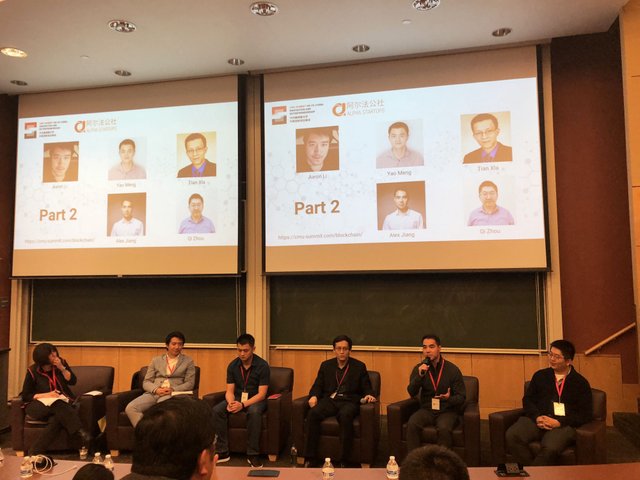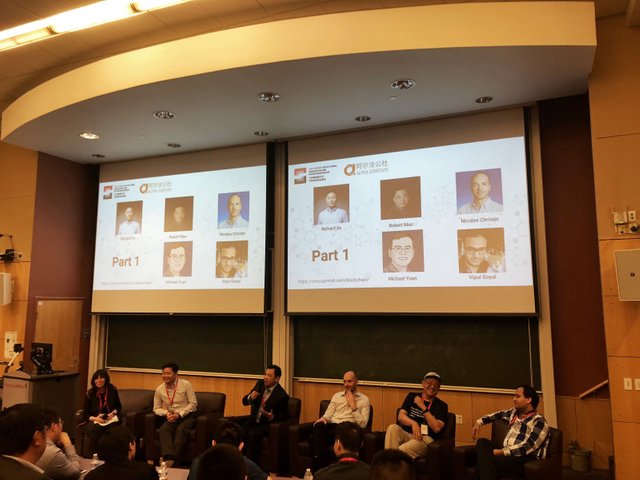CMU Summit : Blockchain Panel — my views on the explosion of cryptocurrencies, the information overload issue, and the promising technologies that could potentially replace Facebook
(I originally published this on Medium, reposting here because it is blocked on WeChat and some other apps in China)
April 14: Last night I was very fortunate to be a guest speaker on the blockchain Panel at CMU Summit moderated by Distinguished Professor Lenore Blum, who founded the startup incubation program at CMU. Here are some highlights I want to share which I discussed what we want to do at Qokka to make crypto and blockchain space better, and blockchain technologies in general.
Before I start, I want to give my thanks to Richard Xu, Alex Jiang, and Gang Liu from Alpha Startup (an investor of Qokka), and Zihan Guo from CMU who co-organized this event with others from CMU Summit committee, together with founders from Quarkchain, ArcBlock, CyberMiles, Crypto Matrix, Trade Terminal, and additionally, Professor Vipul Goyal and Professor Nicolas Christin who shared their insights about blockchain and cryptocurrencies.

From left: Professor Lenore Blum (moderator, CMU), Aaron Li (me, Qokka.ai), Yao Meng (Trade Terminal), Tian Xia (Crypto Matrix), Alex Jiang (Alpha Startup), and Qi Zhou (Quarkchain)

From left: Professor Lenore Blum (moderator, CMU), Richard Xu (Alpha Startup), Robert Mao (ArcBlock), Professor Nicolas Christin (CMU), Michael Yuan (CyberMiles), and Professor Vipul Goyal (CMU)
Q: Tell you about yourself and your expertise relating to blockchain.
A: Hi, my name is Aaron Li, founder of Qokka.ai. We help people who are interested in cryptocurrency investment, or learning more about the technology. We are building an information summary platform for cryptos using machine learning and natural language processing.
I started mining Bitcoin since 2011. I have given a few online talks about the cryptocurrency and blockchain on Youtube (English commentaries coming soon). I acted as a technical advisor to a few friends, for their blockchain investments and projects. In general, I want to help people understand the space better and push it forward.
By the way, I am also a CMU alumni. During my years at CMU I rented a house on S Negley Ave and mined quiet a bit of cryptos there in my basement. Pittsburgh’s cold weather is fantastic for mining!
Q: Aaron, many people believe cryptocurrencies are no more than just bubbles and speculations. Would you like to explain how your technology could help people figure this out, in layman’s terms?
A: Sure. With machine learning, we devour all the information available on the Internet, for each of the thousands of cryptos. We summarize their news, discussions, whitepapers, and more. And we give you the most up-to-date, most relevant, most useful information. So you can make better, faster investment decisions, and learn about the technologies more efficiently. For example, you can get a overview of topics in the summaries. If for some coin, the topics are all about prices and investment returns, it is a strong indicator the crypto is a bubble. For some other cryptos, the topics are all about use cases, technical challenges, code, bugs, and so on. Then, it is a strong indicator that the crypto is trying to do something actually useful.
Q: Aaron, there are already thousands of cryptocurrencies and many with their own blockchains. Will there be far more in the future, or are they going to consolidate?
A: I heard people are drowning in tokens. They think cryptos will consolidate. Their opinion is most cryptos will become worthless, and there will be only one coin for each domain or each kind of service. For example, one single coin for payments, another coin for energy.
I think this belief is not much different to believing Google or Facebook will one day rule the entire Internet. Some people would say this is absurd.
What we have today, is at least ten different coins just for payment, each with their own unique features. There is always tradeoff in crypto design, that makes one crypto better than another, in some perspective, for same kind of service.
So I believe not only most cryptos won’t become worthless, there will be more cryptos, and many of them will flourish. Cryptos and blockchains are fueled by the ambition to create a decentralised future, to be original, and to challenge the status quo. By definition, this is against consolidation and monopoly. Creating a new crypto is much like creating startups, except the evolutions is at much faster speed and bigger scale. Blockchain technologies only made it easier for creative, smart among us to do that. They to think differently, and act differently. Throughout history, they are the ones who create the future. They are called non-conformist. And today we have more of them than we ever had.
Q: Aaron, what are the challenges people face to digest all the information with so many cryptocurrencies and blockchains, and stay up-to-date? How does your company Qokka.ai help people with that?
A: Crypto is hot, and it is moving fast. Right now it is impossible for most people to get timely, high quality information. That’s what motivated me to create Qokka.ai. I believe information overloading is one of the biggest problems in this space. A lot of information is scattered around in different forums and websites. At the same time we have a lot of unreliable information. Right now, to understand what a crypto does or how a blockchain operates, you would have to do hours of research on Google and a bunch of forums. Most of the time you would have to go through tons of shills, scammers, fake news, until you could scratch the surface. I want to build a platform that solves exactly these problems, using the same machine learning tech Qokka already uses on product reviews.
Q: Here is a question for all of you on the panel: we talked a lot about applications, but not much about blockchain technologies. What would be the blockchain technologies that could potentially replace Facebook?
A: I was very excited that you asked this question, Professor Blum. Other guest speakers have shared their versions about the future and I think they sound very exciting. So rather than talking about future possibilities, I would like to talk about something happening right now. I believe Steem is one of the blockchain candidates that could potentially replace Facebook.
Steem has their own frontend platform Steemit, which is like a combination of Reddit and Medium. It rewards tokens to people who create or curate useful content. In fact, I just gave an online talk about Steem on YouTube about a month ago.
Steem is one of the cryptocurrencies with their own blockchain, that doesn’t focus on payment or serving the blockchain ecosystem. Instead, it focuses on real-life applications, and is used by lots of people on daily basis for online discussion. This is very rare in the blockchain world.
As of February it has already 750,000 users, which is 3 times compared to 6 months before that, and the whole things is only about 2 years old. It never did ICO, but it grew from $0 in March 2016 to $1 billion market cap in February 2018. On the technology side, instead of the heavily criticized proof-of-work, Steem uses delegated proof-of-stake which is 1–2 generations ahead of most other blockchains. Additionally, it introduced many other innovations in engineering, ecosystem design, and operation models.
Steem is phenomenal, and we at Qokka are learning from their designs to potentially combat shills, fake news, and unreliable information. In some of these areas, humans can do a much better than machines. There are many things we could do to enhance and augment our machine-learning centric platform with human powers, using blockchain and mechanisms like those introduced in Steem.